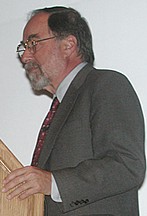|
News & Views item - October 2005 |
 |
|
Photo by Jenny Gerow |
President of Caltech, David Baltimore, Gives His Views on Science and Scientific Research. (October 11, 2005)
In 1975 the then thirty-seven year old David Baltimore was awarded together with Renato Dulbecco and Howard Temin the Nobel Prize in Medicine or Physiology "for describing how tumour viruses act on the genetic material of the cell". He discovered the enzyme reverse transcriptase which translates the base sequence in RNA into DNA.
Baltimore in his capacity as an administrator established the Whitehead Institute for Biomedical Research at MIT and served as its first head and later was appointed president of Rockefeller University from which he was forced to resign after serving only one year because of the controversy which developed over a research paper Baltimore had co-authored with Thereza Imanishi-Kari and others at MIT where Imanishi-Kari was accused of fabricating data. Baltimore himself was not accused of data falsification. He eventually retracted the paper but not before the matter had gained wide notoriety.
In 1996, an expert panel appointed by the federal government cleared Imanishi-Kari of misconduct.
In 1997 Baltimore was appointed president of the Caltech and will retire from the presidency in June 2006 but will remain at Caltech as a biology professor and will pursue HIV and AIDS research through a $13.9 million grant from the Bill and Melinda Gates Foundation.
David Baltimore is also a candidate to become president-elect of the American Association for the Advancement of Science and as such he has written a statement of his views to assist members of the AAAS in determining if they believe they want him as their next president.
Below are excepts of his statement.
One of the most serious problems [currently in science education] is the attraction we see today to theological explanations of established scientific truths like evolution. Raising children who do not know that life and our planet evolved over 4.5 billion years of change and development hamstrings them from participating in modern life.
America has been the source of so much of the innovation of the last 65 years because of at least five factors: our education of risk takers, our funding of basic science, our creative use of capital markets, our development of great institutions that meld education with research, and our attraction as a society to the best and brightest of the world.
Baltimore then goes on to amplify:
Our education system has weakened and needs repair, but in the process we should not lose what is great about it -- its emphasis on personal development. It is that which produces people with the inner strength to take risks.
Our federal funding of basic research has been the envy of the world but has been reduced in recent budgets while other countries have gained on us. Through federal funding, we must provide the resources that generate those high impact discoveries that are the sources of true innovation. Only after the basic discoveries are made will industry recognise the opportunity to create exciting new products.
Our universities and research institutions are the homes for discovery. To the amazement of the rest of the world, we manage to convince private, charitable donors to contribute the bulk of the funds that maintain the infrastructure of these great institutions.
Since the 1930s American science has benefited from a continual inflow of talent from abroad. ...[U]ntil 9/11 we were seen as welcoming, but then we erected high barriers. [Recently we have] liberalized immigration procedures. We must... continue to monitor our policies... so that we can again be seen as [welcoming].
The other source of scientists and engineers we need o maximize is our home-grown talent. We need to concentrate on broadening the focus of our education system. We need to encourage and tap the diversity of talent in a very diverse country. We need to widen the pipeline of women in technical fields and encourage members of our under-represented minority communities to embrace science and technology. We particularly need to critically examine out institutions to make them welcoming to communities that have historically not contributed to their share of talent.
Finally, we need to remind ourselves that science may be an economic driving force of society and may improve our health and wellbeing, but it is also one of the great cultural contributions to society. Through science we learn about the earth and its inhabitants, we learn about the cosmos and its formation, and we learn about the basic principles that underlie our very existence. As scientists, we should never forget that this is our greatest contribution and that disseminating the evidence-based value system that creates true knowledge may be our greatest responsibility.